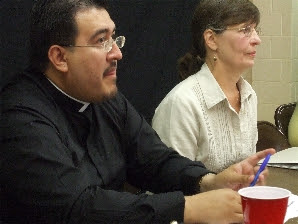Milwaukee - Day 7 (Saturday p.m.)
On August 14th, 2007, exactly 40 days after the immigration bill failed in the Senate, many cities will declare themselves sanctuary cities. What does this mean? It is a renewal of the sanctuary movement that gained momentum between 1982 and 1992. 500 congregations took a stand at that time against the deportation of Central American refugees. “Not in our name!” would they allow people to go back to deadly conditions. Today the new sanctuary movement believes that the conditions of economic repression and the intentional withholding of access to resources is not so different from the conditions of war. It is time for a new sanctuary movement. As such, several cities across the
I don’t know what it will take to make
Speakers for the day are Luz and Christine per usual, Tomas returns to tell his story once again and we are also joined by Henry Hamilton of the NAACP and Joanne Lang who is spearheading the sanctuary movement in
Several political leaders chime in. State representative Pedro Colon comments about his catholic upbringing and how it taught him about justice. Peggy West, the county supervisor and the only political leader who stays for the whole of the forum, assures everyone that no matter what their status, human beings are human beings and they should receive services with dignity. An alderman speaks who is only second generation himself. While of European descent he says he can relate to the struggle of living with parents who did not speak English and working low wage jobs. He claims, that we must allow immigrants easy access to citizenship if that’s what they want, that he does not want the government to “wholesale people back to where they came from.”
And then comes the audience commentary. A young man reminds us that it’s not just about border crossings but also about borders moving. “This is indigenous land” he affirms, “it was taken away from us.”
Another man asks about positive ordinances and the
More of the workers from Whitewater are also in the crowd. Javier talks about his job, “my job was to put pet food in pretty packages.” He asks, “Is it is a crime to make something that looks nice for your cats and dogs to eat?” The deeper question is implicit- if we can afford to buy nice food for our dogs and cats, is it so wrong that he immigrated here to ensure that his children would not starve?
Another worker, who wishes to remain unnamed, is scared. She is crying when she tells us, “I have children, I don’t know what it going to happen to me, I don’t know what is going to happen to my children, I don’t know what is going to happen. My children are citizens.”
And as she cries the audience cries with her. There is a pause for tears and then a call for action.
Our translator for the day, who has been working with the Whitewater workers since the raid almost a year ago, takes off his headphones to share some more information with us. He talks about the upcoming trial and tells us we what can do to be supportive. Be present at the hearings, support the legal defense fund.
Christine wraps up the day with some notes and Jeanne announces upcoming events. The forum closes, information is distributed and membership applications are taken in. This was a successful event- high energy, attentive crowd, translation running smoothly and most importantly people who are empowered. People stay and talk to us afterwards about wanting to be involved, wanting to learn more. Fundamentally, I think this is how we measure the success of this tour. It’s not about numbers in attendance, it’s not about how many opinions we sway. It is about how many people walk out knowing their rights, walk out feeling dignified and most importantly how many grassroots efforts are sparked, how many seeds are planted from what people have heard on this tour.
It is yet to be seen what exactly people will feel called to do, but I am optimistic.

No comments:
Post a Comment